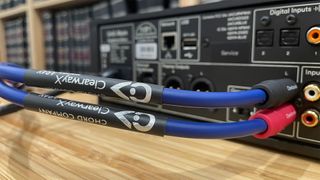It may not seem necessary at first to focus much on the cables in your hi-fi system, but it can be one of the most important factors in your system's overall performance. After all, an audio cable carries the analogue signal between your source (a CD player, turntable or music streamer) and your stereo amplifier – that's an awful lot of necessary information and it is important to keep that signal as pure and accurate as possible with the least amount of interference or degradation.
This is why the quality of audio cables – otherwise known as 'audio interconnects' or 'RCA cables' – can significantly affect your system's performance. Cables matter, and they're often a major aspect of most hi-fi systems that gets overlooked time and time again. As with speaker cables, this is an area you don't want to overlook or scrimp on if you want your hi-fi system in tip-top shape.
So where should your buying decision start? Well, you can skip ahead to our 'how to choose the right audio cables for you' section below, or simply scroll down to see the three audio cables we most recommend.
This trio represents the best-value audio cables our expert in-house reviews team has tested and span various budgets (the prices are per metre) and suit most user needs, too. Whether you're after a decent budget cable for your modest set-up or your high-end system demands more investment and care, these RCA interconnects will make the most of your hi-fi's potential.
The quick list
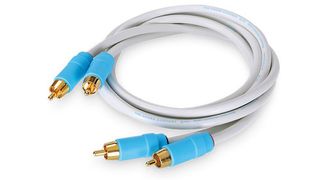
The sweet-spot combination of price and performance, Chord's C-line interconnect is sonically compatible with a wide range of hi-fi products.
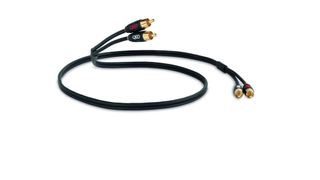
Ideal for entry-level or modest systems, this long-proven audio interconnect remains a solid buy for replacing the cheap cables that come in the box.
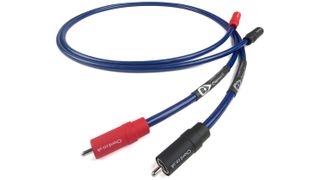
Perfect for more demanding, premium systems. If you have a higher budget, this updated Chord Company interconnect will bring out the best in your hi-fi system's performance.

Having written about hi-fi for over a decade and spent years of that time in our state-of-the-art testing facilities on a daily basis, reviewing everything from high-end stereo amplifiers to entry-level turntables, I've heard the difference poor (and high quality) audio cables make to a system – so I highly recommend that you pay attention to your system's cabling (that includes speaker cables too) if you want it performing at its best. Having had a hand in testing all three cables on this page, I'm confident one will suit most people's needs and budgets. Still, before committing to a purchase, make sure you read our review to ensure its character will suit that of your system.
Best audio cable overall
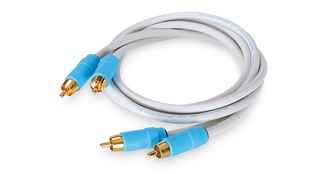
If you've ever wondered what difference a metre of cable can make to your system, we'd urge you to give the C-line a listen.
This is the venerable British cable company displaying once again an understanding of what makes hi-fi great, with the best-value audio cable we've heard at this affordable price point. It never loses sight of what matters – the musicality of your system – and is a deft hand at communicating your system's detail levels, making for an entertaining and informative listen.
Indeed, in terms of overall enjoyment, little at this price level comes close to what the C-line can do for your system. And that's why this model has won multiple What Hi-Fi? Best Buy Awards on the trot.
Read our full Chord Company C-line review
Best budget audio cable

Despite the über-budget price tag, the QED Profile analogue interconnect punches above its weight, helping to deliver a tight sound that’s uncluttered and airy. Detail levels are surprisingly good for the money too, and the well-made Profile cables also show ability with their handling of dynamics.
These cables have been around for years now but remain a solid buy if you are looking to go one better than your typical cable supplied in the box. As a first upgrade for an entry-level system (where components are a couple of hundred pounds or dollars each), this QED interconnect is a great option.
Read our full QED Profile review
Best premium audio cable

The original Clearway analogue interconnects were around for a good while but were finally revised in 2022 in the Chord Company Clearway RCA Analogue (2022) to introduce new plating to the plugs. The even newer and current Award-winning ClearwayX ARAY Analogue RCA interconnect is another premium option if your budget can stretch ever further, and especially if your system is transparent enough to benefit from it. The 'X' in its name denotes the addition of the XLPE dielectric material, and this has a significant impact on the cable’s overall ability.
Other elements of the cable remain the same as the 2022 model, including the new ChorAlloy multi-metal plating on the plugs, and we found the new ClearwayX ARAY Analogue RCA interconnect was able to eke out a greater degree of control, punch and musical expression from our (admittedly high-end) system.
The ClearwayX Aray shares the same characteristics as its predecessor, allowing our system to deliver an open, crisp, rhythmically cohesive sound, but with that bit more detail, momentum and precision to the sound overall. With this cable used in our system, background noise levels are lowered too, allowing for a cleaner, more open sound.
The price tag might weigh heavy on many listeners’ wallets – and the cheaper C-line remains a class leader we can still get behind – but for those who can justify the outlay and have a high-end system that will benefit from the upgrade, it is brilliantly capable of letting you hear where your money has gone.
Read our full Chord Company ClearwayX ARAY Analogue RCA review
Also consider
- Atlas Element Achromatic: It’s possible to buy alternatives that are livelier and more obviously entertaining (such as Chord’s Clearway Analogue RCA above), but it’s hard to think of anything at this price that makes our system sound as neutral and pleasingly hands-off as this. This is a clean and precise-sounding performer.
How to choose the right audio cables for you
A good starting point for choosing audio cables is to get in touch with the manufacturer of your stereo amplifier and ask if they recommend a particular brand or model of interconnect. After all, engineers will have spent hours experimenting during the development process and you might be told some valuable nuggets of information which might make your job of finding something suitable more simple.
You could also speak to your local dealer to see if they have tried different cables during demos and found any that work particularly well with your amplifier.
Otherwise, when it comes to picking the right audio interconnects, a lot of your decision-making will revolve around price and, of course, your system, whether you're putting one together or already have one set up.
As a general rule of thumb, we'd recommend setting aside 10 to 15 per cent of the total cost of your system for cables. In the case of a hi-fi set-up, you'll be looking at analogue interconnects, speaker cables and, potentially, a digital optical or coaxial cable depending on the sources you're using. So you'll want to dedicate a share of this to a pair of suitable analogue interconnects.
If you currently own an excellent entry-level set-up, you don't need to spend big on interconnects. However, at the same time, nothing is stopping you from trying more premium pairs to see how your system reacts. On the flip side, If you own a high-end set-up, we'd suggest looking at price-comparable interconnects, though you could also audition some cheaper interconnects too. As always, the best way to choose any component for your system is to listen.
You'll also want to decide whether you want an unbalanced RCA cable (which is the most typical, cost-effective analogue solution and the type pictured above) or the balanced XLR cable (which is pricier but for good reason: it better rejects the electrical interference and radio frequency noise it is subject to in a room, and is considered a better choice particularly for longer distances). Popular audio cables such as those above come in a choice of either.
One last piece of advice would be to avoid choosing audio cables purely on their What Hi-Fi? star rating. Read our reviews to help you understand the character of the cable and see if it matches the character of your hi-fi system.
How we test audio cables
The What Hi-Fi? team has more than 150 years of combined experience in reviewing, testing and writing about consumer electronics. We have state-of-the-art testing facilities in London and Reading, where our expert reviewers do all our in-house testing. This gives us complete control over the testing process, ensuring consistency across every product we review.
The first thing we do to a pair of analogue interconnects is run them in by connecting them to our reference system over at least a weekend. In our experience, their impact on a system can change over time so we make sure they have a couple of days with an audio signal running through them before we start listening.
When connecting them, we also pay attention to the cable's directionality, which is usually marked on the plugs' cable sheaths via arrows. These arrows reveal the direction of the signal from the source to your amplifier.
During testing, we start listening through our high-end reference system as its transparency allows us to hear exactly how the characteristics of the cable are affecting the sound. We also connect them to a more price-compatible system to hear how they work in a more typical scenario. As we keep stock of class leaders in every hi-fi category, we can compare each cable to its closest price-matching rival(s) to see how it fares in the market context. Naturally, this helps us reach a verdict and star rating.
All our review verdicts are agreed upon by the team rather than an individual reviewer, to eliminate any personal preference and ensure we're being as impartial and thorough as possible, too. There's no input from PR companies or our sales team when it comes to our verdicts on audio cables, with What Hi-Fi? proud of having delivered honest, unbiased reviews for decades.
That's why if you take the plunge and buy one of the products recommended below, or on any of our other Best Buy pages, you can be confident you're getting a What Hi-Fi?-approved product.
You can read more about how we test and review products on What Hi-Fi? here.
FAQs
What do audio cables do?
Audio cables (otherwise known as RCA cables or interconnects) connect your source, whether that be a music streamer or CD player, to your stereo amplifier or active speakers. In a hi-fi separates system like this, they are necessary to carry line-level audio signals from one component to another.
There are various types of audio cable, including the most traditional and prevalent RCA (unbalanced) as well as XLR (balanced) on the analogue side; on the digital side, the most common audio cable is S/PDIF coaxial RCA or optical.
Which type of audio cable you want will largely depend on the connections offered by both your source and stereo amp/active speakers, though other factors play a part too. For example, if your setup requires a long cable run, a balanced XLR cable might be preferable over an unbalanced RCA one due to its superior blocking of electrical and RF (radio frequency) noise that inherently gets picked up by all cables in domestic spaces.
How much should you spend on audio cables?
There isn't a hard and fast rule here, but generally speaking, 10 to 15 per cent of your whole system cost should be dedicated to cabling. That includes speaker cables as well as audio cables.
When buying, be sure to measure the space your system is in so you know how many metres to buy, too – most specialist retailers sell speaker cables by the metre.
Recent updates
- September 2024: Added the current Award-winning Chord Company's ClearwayX ARAY Analogue RCA entry into the main list.
- April 2024: Added Also Consider and FAQ sections to help better inform readers in their audio cable buying decision.
- October 2023: Added mentions of Chord Company's ClearwayX ARAY Analogue RCA audio cable following its What Hi-Fi? Awards 2023 win.
